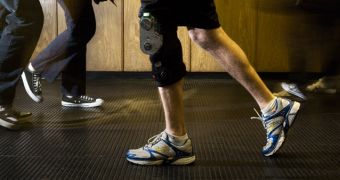Low battery? This will never be a problem with a new machine that "sucks" power from the movement of the knees while walking. In the new research published in the journal "Science," 6 subjects wearing the devices on their legs while strolling on a treadmill delivered about 5 watts of electrical power each, enough for charging 10 cell phones at the same time.
"Since muscles are the powerhouses of the body, my colleagues and I designed our device to generate electricity from the motion of the knee joint. It resembles a knee brace and weighs about 1.5 kilograms [3.3 pounds] including the gearing and generator," said Max Donelan, director of the Locomotion Laboratory at Simon Fraser University, in Canada.
The device captures the energy by connecting an electrical generator to knee motion. When the person extends the knee, power is generated by a gear that turns and spins the generator. The flexion of the knee turns off the gear so as not to discomfort the person.
The new device is motion-sensitive, being auto-activated by knee movement, and it does not increase the energy spent with walking. The last point was checked by measuring the subjects' oxygen intake and carbon-dioxide output.
"People are an excellent source of portable power. An average-sized person stores as much energy in fat as a 1,000-kilogram battery. People recharge their body batteries with food and, lucky for us, there is about as much useful energy in a 35-gram granola bar as in a 3.5-kilogram lithium-ion battery. The device could be used to power computers in remote regions where electricity is scarce," said Donelan.
"The early markets are people whose lives depend on portable power, such as people with artificial limbs. On the military side, soldiers have an incredible dependence on batteries these days, so both these groups could benefit," Donelan told LiveScience.

 14 DAY TRIAL //
14 DAY TRIAL //